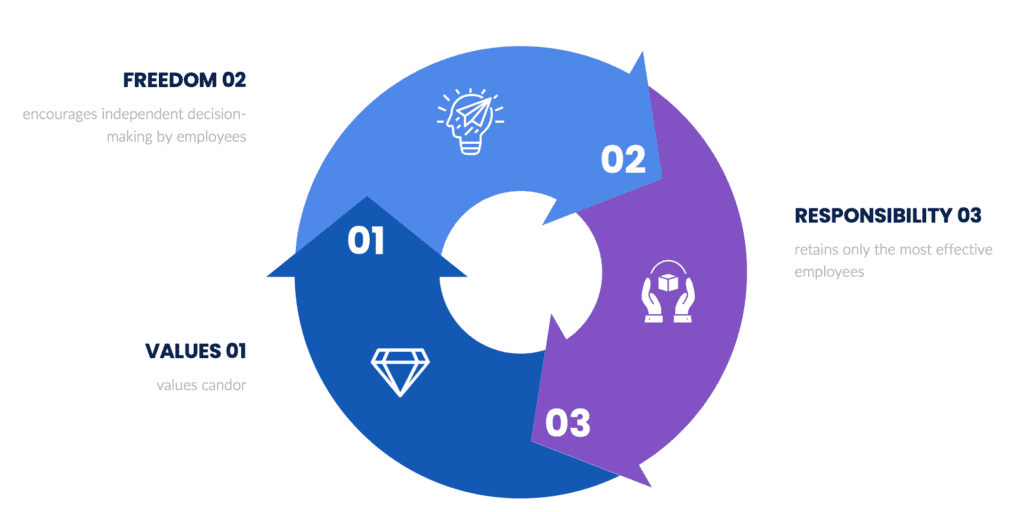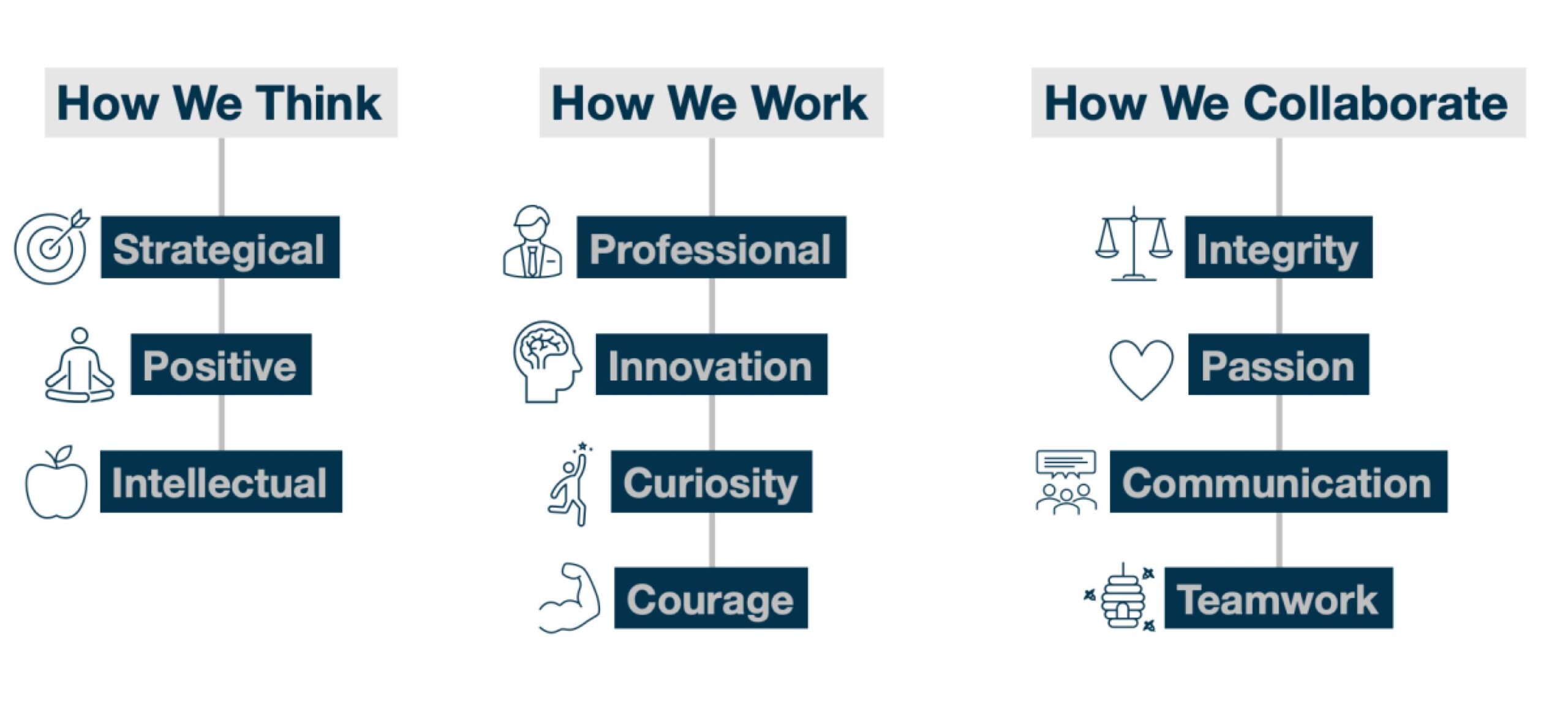Engineering is more than a profession—it’s a lifestyle, a means of expressing our needs and ambitions. A well-engineered world is a safer, better, and more inclusive place.
At SEERO, we are committed to building that better world by continually nurturing a distinctive working culture.
Like all leading organizations, SEERO hires and retains top talent, placing great importance on integrity, excellence, respect, intelligence, and collaboration.
We:
Encourage independent decision-making among employees
Foster open, broad, and intentional sharing of information
Value honesty and candor
Retain only the most effective contributors
Our core philosophy is both people-centric and process-oriented. We’ve developed practical, precise processes that enhance operations while empowering our team to perform at their best.
At SEERO, brilliant minds come together to form a formidable team—making us a well-rounded and successful organization.
The SEERO culture is rooted in three principles: Values, Freedom, and Responsibility.


Our values reflect the ethical principles, behaviors, and skills that define the way we work. The more these values resonate with you—and with the kind of people you aspire to work alongside—the more likely you are to accomplish great things with us.
In some companies, people leave their garbage lying around for other people to throw away. In other companies, everyone clears up behind them, like they would at home. In SEERO, we try hard to be the latter – creating a sense of responsibility that encourages everyone to do the right thing to help the company at every opportunity. The result is that we do not need rules about picking up the real or metaphorical trash, the sense of ownership means it comes naturally.
Our credo is: inspiration before management. We trust our team to do what they think is best for SEERO — giving them the freedom, power, and information to support their decisions. In turn, this generates the sense of responsibility and self-discipline that drives us to do great work for the company.
We believe people thrive on trust, freedom, and knowing they can make a difference. So, we cultivate independence and foster empowerment wherever possible.
We avoid rigid over-specialization and chaotic growth while maintaining freedom. We keep business as simple as possible, given our growth ambitions and the need to ensure that our employees keep excelling. Our ideal is a company where self-disciplined people discover and fix issues without being told to do so.
Of course, there will always be a couple of places where we still need rules. Like ethical and safety issues. We have zero tolerance for harassment of employees or trading on insider information.
Some things are done to increase productivity, and some things are done to reduce errors. We like strategies that help us achieve more. One such approach we do well is to schedule meetings effectively. We have regular meetings with well-prepared agendas, and we start and end on time. Our meetings are to learn from each other and get more done, rather than error correction or approving decisions.

Before making a judgment call, a responsible ship’s captain consults their officers and considers their views. Decision-making committees are slow and diffuse responsibility and accountability. We do not use them. We incentivize dissent. Disagreeing is not always natural or easy, so we have to nurture it. Groups might meet to debate a topic, but when the action starts, someone has to be that “captain.” Minor decisions can be shared by email, but major ones will merit a memo that sets out the options and says why the captain made their choice. The bigger the decision, the more dissent/assent gathering needs to be gathered and shared, usually in an open document. This is not the same as a majority or committee vote. We are not looking for consensus or rapid, uninformed decision-making. This is about getting a full picture with all the information. When the captain is reasonably confident of the right bet for us to take, they decide, and we make that bet. Afterward, as the impact becomes more apparent, we reflect on the decision and see if we could do even better in the future.
If you disagree on a material issue, it is your responsibility to explain why, ideally in both discussions and writing. Discussions are a useful way to clarify different views, while a concise statement of the core issues helps people reflect on the wisest course and makes it easy to share their thoughts. The captain on that decision has the responsibility to welcome, understand, and consider your opinions but will make their own decision at the end. Once the captain has made the decision, we expect everyone to pull together to ensure it as successful as possible. If significant new information becomes available later, it is OK to ask the captain to revisit the topic. Stay silent and you lose the chance for your disagreement to be a productive contribution.
The bigger companies get, the more centralized and inflexible they become:
SEERO avoids these traps by being highly aligned and loosely coupled. We debate strategies together and then trust each other to execute on tactics without prior approvals. Often, two groups working on the same goals will not know or have any say in what each other are doing. If things are not going in the right direction, we would have a candid discussion. Maybe the strategy was too vague, or the tactics did not align with the agreed plan. Then we discuss how we can do better in the future.
The success of a “Highly Aligned, Loosely Coupled” work environment depends on high-performing individuals collaborating in an effective context.
The ultimate goal is more growth with more flexibility and more agility. Big, fast, and agile is possible.
Seeking Excellence
New employees are often surprised to find this culture description matches their real-world experience. We live and create our culture together.
We are not out to preserve our culture — we aim to improve it. Each new team member contributes to taking that culture a step further. Different viewpoints combine to enable us to achieve more. At any time, we can take stock and see the real difference in how much more effective we are than we were just a few years previously. The process accelerates as more dedicated people with diverse perspectives join us in finding better ways for our talented team to work together more cohesively, nimbly, and effectively.
We want our employees to be independent decision-makers who only consult their managers when they are unsure of the right decision. The leader’s job at every level is to provide the clear context others need to make informed decisions.
The myth of the towering leader with a hand in every detail of the product is not for us. According to the legend, Steve Jobs had the final say on every aspect of the iPhone, and he made it a great product. Some followers want to go even further, from micro-managers to nano-managers. Network and studio heads sometimes decide they know more about the creative process than their artists. Top-down involvement in the day-to-day is not our model. We believe we are most effective and innovative when employees decide.
Every part of SEERO strives to build its decision-making muscles. We pride ourselves on how rarely senior management has to get involved. It’s not hands-off management, it’s better management. The leader’s role is to teach, set context, and be aware of what is happening. Setting the right context setting means understanding the details. But unlike a micro-manager, this knowledge is not for intervening in every little decision, but for learning how to adjust context, so more decisions are made well.
Of course, a few cases of “control not context” remain. Leaders will take control:
We tell people they are not here to please the boss. They are here to serve the business. Disagreeing with your manager is fine. Hiding information or an opinion is not. Go ahead and tell your manager, “I know you disagree, but I’m going to do X because it is a better solution. Let me know if you want to override my decision specifically.” We do not want you guessing what your manager would do and trying to fit in with that.
It’s easy to write out a set of admirable values. It’s harder to live them. Describing courage, we say, “Question actions inconsistent with our values”. We must push each other to live our values and hold each other responsible for being role models. Our aspirations should never end.
Describing integrity, we say, “Only say things about your colleagues that you would say to their face.” This principle is one of the hardest for new people to believe — and to learn to practice. In most situations, whether social or professional, people who consistently say what they think about people are quickly isolated and pushed out. We work hard to get people to give each other professional, constructive feedback across the organization. We start at the top to demonstrate that even leaders can gain from openness to feedback. Keep two questions front and center: “What could I be doing better?” and “What feedback have I not yet shared?”
Easy, regular giving and receiving of feedback promotes faster, bester learning. Feedback is not an occasional formal exercise, it’s a continuous effort to communicate and working with each other. Giving construction feedback to our colleagues, even if it makes us uncomfortable, is a selfless act that builds trust. Feedback helps us to avoid misunderstandings and the need for rules. The free exchange of feedback rests on a solid underlying relationship and trust, which is part of why we invest time in developing those professional relationships. We celebrate the very candid people, especially those in positions of power. We know this level of honesty and feedback can be difficult for new hires and people from cultures where direct feedback is uncommon. We actively help people learn how to do this at SEERO through coaching and modeling the behaviors we want to see in every employee.
SEERO is well-rooted in the communities where we work. People support us and want to see us grow. This inclusiveness is one of the key elements of our success. The relationships we build through SEERO create the feeling where almost everyone we know is eager to offer support. We empower and promote this feeling by ensuring that we are well connected and supported by the communities.
Being on a dream team is not for everyone, and that’s OK. Some will prefer job security, stability, seniority, and tolerance for inefficiencies. Our model works best for people willing to risk a higher commitment to achieve consistent excellence in themselves and their colleagues.
Ultimately, your economic security is based on your skills and reputation, not on your seniority at one company. At SEERO, you learn how to solve complex problems as a member of a fantastic team, and what you learn increases your market value. It’s nice to know how much other companies would like to hire you. Go and have an occasional outside interview, it’s a healthy opportunity where you can learn something valuable to discuss with your manager.
No matter how great our team members and successes, we know we can always do better. We set our sights on improvement with calm confidence. What we are now is still nothing compared to what we will be.